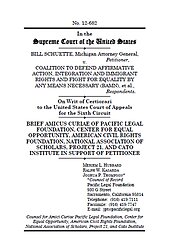Schuette v. Coalition to Defend Affirmative Action
Learn more about Cato’s Amicus Briefs Program.
It’s unusual that the Supreme Court would choose to review an affirmative action case even though Fisher v. UT‐Austin was still pending. Ordinarily, when faced with a second case on the same legal issue, the justices “hold” it until they decide the first, then either send the second one back to the lower court to apply the newly announced rule or, perhaps, schedule it for oral argument on any additional issues that need to be addressed. Yet Schuette v. Coalition to Defend Affirmative Action is no ordinary case. Schuette asks whether a ban on racial preferences — or at least how that ban was enacted — violates the Equal Protection Clause, whereas Fisher asked whether their use does. In Schuette, 58% of Michigan voters approved Proposal 2 (a.k.a. the Michigan Civil Rights Initiative), a state constitutional amendment that prohibited racial preferences in public education, employment, or contracting. That ban was challenged by a coalition of groups and individuals who support the continued use of affirmative action, particularly at institutions of higher education. A federal district court upheld the ban, but then a panel of the U.S. Court of Appeals for the Sixth Circuit struck it down by a 2–1 vote. The full Sixth Circuit then agreed that Prop 2 was unconstitutional, in a contentious 8–7 ruling that produced five separate dissenting opinions. Now before the Supreme Court, Cato has joined the Pacific Legal Foundation and four other organizations on an amicus brief arguing that Michigan voters have acted constitutionally by prohibiting race‐ and sex‐based discrimination or preferential treatment in public university admissions. We contend that Prop 2 doesn’t violate the Equal Protection Clause under the Court’s “political structure” precedent, which outlaws subtle distortions of governmental processes in a way that places special burdens on the ability of minority groups to achieve beneficial legislation. The measures struck down under that line of precedent differ markedly from Prop 2 because, unlike in those older cases, minorities now have more protections against discrimination. Moreover, these protections apply across all levels of state government, not just discrete functions like housing and school busing. Furthermore, Prop 2 creates no racial classifications so it cannot trigger “strict scrutiny” review. The simple fact that Prop 2 deals with race does not imply that it somehow disenfranchises racial minorities. If the Court finds that the “political structure” doctrine prohibits Prop 2, that precedent must be overruled as inconsistent with the text of the U.S. Constitution — though this is probably unnecessary given more modern precedent. Interestingly, the California Civil Rights Initiative, known as Proposition 209, has been upheld repeatedly by the (notoriously left‐wing) Ninth Circuit. Indeed, there is a wealth of evidence showing that minorities are succeeding under that system, which also prohibits the consideration of skin color in college admissions — and has led to higher attendance and graduation rates. We urge the Supreme Court to side with Michigan’s voters and hold their ban on racial preferences (which the Court itself has admitted to be on shaky constitutional ground) to be constitutional.

